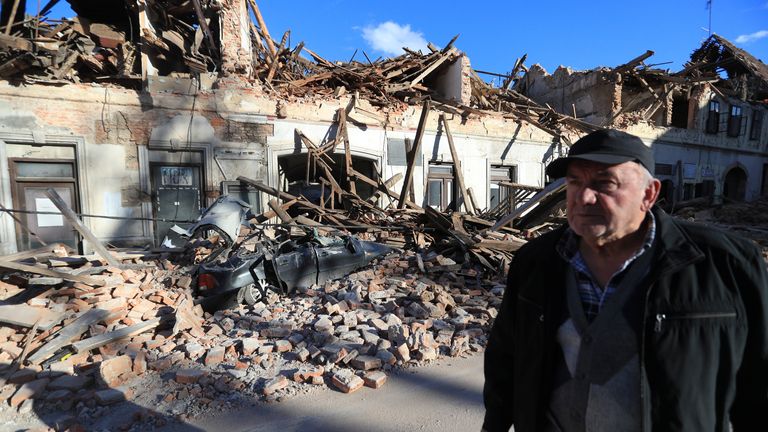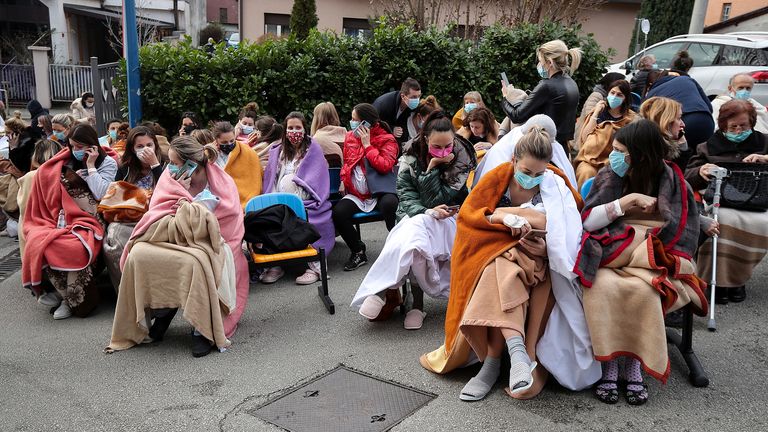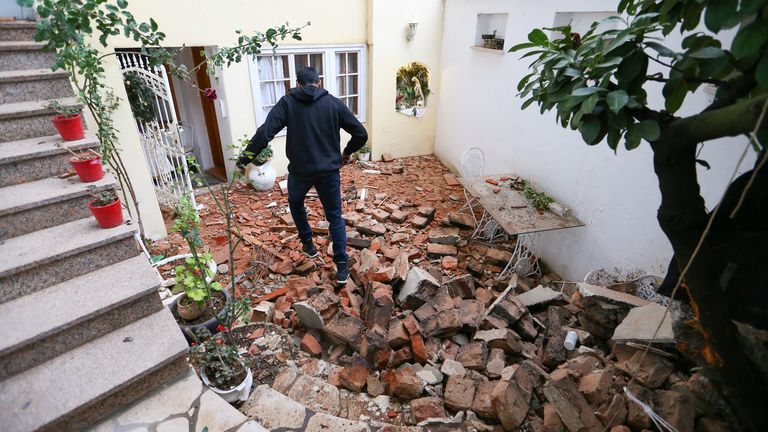A 6.4 magnitude earthquake has hit Croatia, with reports of at least one death, many injuries and "demolished" towns.
The European-Mediterranean Seismological Centre said the tremor hit 28 miles southeast of the capital, Zagreb.
A 12-year-old child in the town of Petrinja - 31 miles from Zagreb - has been killed, according to the N1 news channel.
Petrinja's mayor, Darinko Dumbovic, announced on a local TV broadcast that his town has been "completely destroyed".
"We have dead children," he said.
"Half of the city no longer exists. The city has been demolished, the city is no longer liveable. We need help."
Tomislav Fabijanic, head of the emergency medical service in Sisak, said there were many injured in the city and in Petrinja.
"There are fractures, there are concussions and some had to be operated on," he said.
At least 20 people went to hospital with injuries, he said, with two seriously hurt.
"The army is here to help. We will have to move some people from Petrinja because it is unsafe to be here," Prime Minister Andrej Plenkovic said.
European Commission President Ursula von der Leyen said on Twitter that she had spoken with Mr Plenkovic and ordered an envoy to urgently travel to Croatia.
Video footage showed people being rescued from rubble near the epicentre. Other clips showed houses caved in.
The same area was struck by a 5.2 magnitude quake on Monday, killing one person and injuring 27.
The earthquake was felt throughout the country and in neighbouring Serbia, Bosnia and Slovenia - even as far as southern Austria.
Mr Plenkovic and other government ministers arrived in Petrinja after the earthquake.
"They are searching through the rubble to see if there is anyone else there,'' he said.
"The biggest part of central Petrinja is in a red zone, which means that most of the buildings are not usable."
Mr Plenkovic said the army has 500 places ready in barracks to house people, while others will be accommodated in places including nearby hotels.
"No one must stay out in the cold tonight," the PM said.
Slovenia's STA news agency said that the country's sole nuclear power plant was shut down as a precaution.
Video footage showed politicians fleeing parliament in the capital city of Ljubljana as the building shook.
Zagreb residents were seen running out of their homes and into streets and parks. Many reportedly were leaving the capital, ignoring a travel ban imposed due to the coronavirus pandemic.
Croatia is prone to earthquakes, but not big ones.
The last strong quake struck in the 1990s when the Adriatic coast village of Ston was destroyed.
Croatian seismologist Kresimir Kuk described Tuesday's earthquake as "extremely strong," far stronger than another one that hit Zagreb and nearby areas in the spring.
He warned of potentially strong aftershocks across the Mediterranean country.
https://news.google.com/__i/rss/rd/articles/CBMiamh0dHBzOi8vbmV3cy5za3kuY29tL3N0b3J5L2VhcnRocXVha2UtaGl0cy1jcm9hdGlhLXdpdGgtcmVwb3J0cy1vZi1pbmp1cmllcy1hbmQtZGFtYWdlZC1idWlsZGluZ3MtMTIxNzQ3ODXSAW5odHRwczovL25ld3Muc2t5LmNvbS9zdG9yeS9hbXAvZWFydGhxdWFrZS1oaXRzLWNyb2F0aWEtd2l0aC1yZXBvcnRzLW9mLWluanVyaWVzLWFuZC1kYW1hZ2VkLWJ1aWxkaW5ncy0xMjE3NDc4NQ?oc=5
2020-12-29 15:10:05Z
52781271427414





Tidak ada komentar:
Posting Komentar